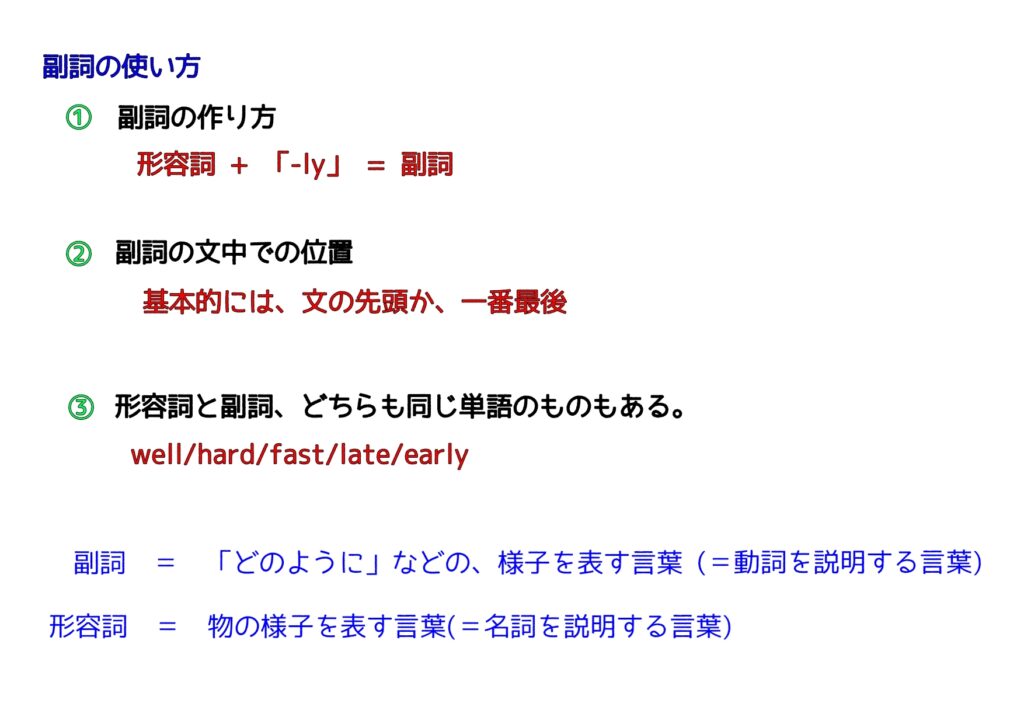第67回:強調を表す時に使える表現

この記事で、会話でよくある強調表現をマスターできます!
Q. この記事で、一番大事なことって何?
A. 大事なことを、1枚の画像にまとめました。

いちいちノートにまとめるのが面倒だという方、また、
ノートにまとめることが苦手だという方は、ご活用ください。

[広告]
確かな英語力は、日々の継続から。
その継続を後押しする、第二言語習得理論に基づいた
オンライン英語学習プログラムがあります。
英語を使う人のための、確実なスキルアップが望める
7日間の無料体験はこちらから!

Gradable(比較可能な)形容詞とNon-gradable(比較不可能な)形容詞
- Gradable(比較可能な)形容詞:
Gradable形容詞は、比較副詞を修飾語として使うことで、ある特定の品質の度合いを表現することができます。(何かと比べて、どんな状態なのかを表す形容詞)以下に、一般的に使われるGradable形容詞とその修飾語をいくつか例示します:
- angry(怒っている)、big(大きい)、busy(忙しい)、clever(賢い)、common(一般的な)、different(異なる)、fast(速い)、friendly(友好的な)、happy(幸せな)、important(重要な)、low(低い)、popular(人気のある)、quiet(静かな)、rich(裕福な)、strong(強い)、weak(弱い)、young(若い)
- 修飾語:a bit(ちょっと)、dreadfully(非常に)、extremely(非常に)、hugely(非常に)、immensely(非常に)、intensely(強烈に)、rather(かなり)、reasonably(適度に)、slightly(わずかに)、very(非常に)
- She was extremely rich.(非常に裕福でした。)
- It’s hugely popular.(非常に人気があります。)
- The people there are reasonably friendly.(そこの人々は適度に友好的です。)
- They’re slightly different.(わずかに異なっています。)
- Non-gradable(比較不可能な)形容詞:
Non-gradable形容詞は、それらが表現する品質には異なる程度がないため、非常にや非常になどの比較副詞とは使用されません。代わりに、これらの形容詞はその極端な性質や絶対性を強調するために非比較副詞を使って強調されます。多くの分類形容詞がNon-gradable形容詞に該当します。
- 非比較副詞:absolutely(絶対に)、completely(完全に)、entirely(完全に)、perfectly(完全に)、practically(ほとんど)、simply(単純に)、totally(完全に)、utterly(全く)、virtually(ほとんど)、almost(ほとんど)、exclusively(排他的に)、fully(完全に)、largely(主に)、mainly(主に)、nearly(ほとんど)、primarily(主に)
- Non-gradable形容詞の例:awful(ひどい)、excellent(優れた)、huge(巨大な)、impossible(不可能な)、superb(素晴らしい)、terrible(ひどい)、unique(ユニークな)、unknown(未知の)、wrong(間違った);domestic(国内の)、environmental(環境の)、agricultural(農業の)
- She’s completely wrong.(完全に間違っています。)
- He was practically unknown to the public.(一般の人々にほとんど知られていませんでした。)
- It was absolutely superb.(絶対に素晴らしかったです。)
- The region is largely agricultural.(その地域は主に農業です。)
Gradable形容詞は、特別な強調やユーモアのために非比較副詞と共に使用されることがありますし、Non-gradable形容詞も比較副詞と組み合わせられることがあります。
- 例:What you’re asking isn’t just difficult – it’s extremely impossible!(質問していることは難しいだけでなく、非常に不可能です!)
- 例:You’ve won a hundred pounds? Wow, you’re virtually rich!(100ポンドも勝ちましたか?うわー、あなたはほとんど裕福です!)
ただし、上記の表で示されるすべての形容詞に対してすべての副詞が使用できるわけではありません。例えば、「absolutely huge」とは言いますが、「completely huge」とは通常言いません(特に強調やユーモアの場合を除く)。
- “fairly,” “really,” “pretty”の使用:
“fairly”(かなり)、”really”(本当に)、”pretty”(かなり)という副詞は、Gradable形容詞とNon-gradable形容詞の両方に使用されます。これらの副詞は、表現する品質の程度を示します。
- She’s fairly popular at school.(学校でかなり人気があります。)
- I’m really busy at the moment.(今、本当に忙しいです。)
- It’s a pretty important exam.(かなり重要な試験です。)
- It was a fairly awful film.(かなりひどい映画でした。)
- The flooding was really terrible.(洪水は本当にひどかったです。)
- The bill was pretty huge.(請求書はかなり巨大でした。)
ただし、非比較形容詞であるが、非常に良いまたは必要なものを表す場合には、「fairly」(または「very」)は使用しません。
- Experience is really/pretty essential for the job.(仕事には本当に/かなり必要です。)
- The weather was really/pretty perfect.(天気は本当に/かなり完璧でした。)
さらに、非常に優れた品質を示す「invaluable」(非常に貴重な)、”superb”(素晴らしい)、”tremendous”(すばらしい)、”wonderful”(素晴らしい)などの特定のNon-gradable形容詞は、通常、「fairly」や「very」といった修飾語を必要としません。
Gradable形容詞とNon-gradable形容詞の違いを理解することで、それらを適切に修飾語と組み合わせることができます。また、「fairly」、「really」、「pretty」を使用して、それらが表現する品質の異なる程度を示すことができます。
具体例
Gradable adjectives can be used with grading adverbs to indicate varying degrees of a particular quality. Here are some additional examples of gradable adjectives used with grading adverbs:
- She’s incredibly clever.
- The party was quite big.
- He’s slightly fast.
- The concert was very loud.
- It’s reasonably affordable.
Non-gradable adjectives, on the other hand, do not have varying degrees of a quality and are not used with grading adverbs like very or extremely. Instead, they can be emphasized with non-grading adverbs. Here are some examples of non-gradable adjectives used with non-grading adverbs:
- The view was absolutely breathtaking.
- The performance was completely flawless.
- It’s entirely impossible.
- The decision was practically unanimous.
- The outcome was utterly unexpected.
It’s important to note that gradable adjectives can sometimes be used with non-grading adverbs for emphasis or humor, and vice versa for non-gradable adjectives. Here are additional examples showcasing this usage:
- That car is simply enormous!
- The situation is virtually perfect.
- It’s pretty awful weather today.
- You’re fairly amazing at playing the piano.
- The cake was really terrible.
Additionally, adverbs such as fairly, really, and pretty are commonly used with both gradable and non-gradable adjectives to indicate a degree of the quality. Here are some more examples:
- She’s fairly intelligent.
- The book is really interesting.
- It’s a pretty difficult task.
- The movie was fairly entertaining.
- The concert was really amazing.
However, it’s worth noting that fairly (or very) is not generally used with non-gradable adjectives that indicate something is excellent or necessary. Here are examples illustrating this:
- Experience is absolutely essential for the job. (not… fairly essential)
- The weather was really perfect. (not… fairly perfect)
Other non-gradable adjectives that fall into this category include invaluable, superb, tremendous, and wonderful.
[広告]
TOEICのスコアを上げたいけれど、
まとまった勉強時間が取れなくて困っている…
なら、細かいスキマの時間を使いながら、
少しずつスキルを積み重ねてみてはどうでしょう。
スマホ1つでスコアアップが出来る、
オンライン講座のリンクはこちらから。

Q. この文法はどうやって使うのでしょうか?
A. 今回の文法を活用した会話文を見てみましょう。

How was the concert last night?
(昨夜のコンサートはどうだった?)

It was extremely loud! I could hardly hear anything.
(すごくうるさかったよ!何も聞こえなかったよ。)

Really? I thought it was just reasonably loud. I guess we have different preferences when it comes to music.
(本当に?私は丁度いい音量だと思ったけど。やっぱり音楽の好みは人それぞれだね。)

Well, I prefer something a bit quieter and more melodic. So, it wasn’t really my cup of tea.
(私はちょっと静かでメロディアスなものが好きなんだ。だからあまり合わなかったかな。)

Yeah, definitely. I’m a fan of intense and energetic performances. It was right up my alley.
(そうだね。私は激しいエネルギッシュな演奏が好きなんだ。すごくハマったんだ。)

That’s understandable. Different people have different tastes. But I must say, the band was hugely popular among the crowd.
(それはわかるよ。人それぞれ好みがあるからね。でも、そのバンドは観客の間でめちゃくちゃ人気があったよ。)
[広告]
ロゼッタストーン・ラーニングセンターで、最先端の教育制度を活用して英語を学びませんか?私たちは個々の学習ペースに合わせてeラーニングと対面教育を組み合わせ、柔軟な学習環境を提供しています。自宅でのeラーニングと対面教育のメリットを最大限に活かし、あなたの英語学習をサポートします。最新のテクノロジーと個別の指導が組み合わさった当センターで、自由な学習スタイルを体験してみませんか?英語学習を楽しく効果的に進めるための環境がここにあります。新たな一歩を踏み出して、新しい英語学習の旅に参加しましょう!

Q. この記事の要点は?
A. 会話でよくある強調表現を確認しました。
- Gradable adjectives can be modified by grading adverbs to express varying degrees of a quality.
- Non-gradable adjectives do not have degrees of comparison and are not modified by grading adverbs. Instead, they can be emphasized by non-grading adverbs.
- Gradable adjectives can sometimes be used with non-grading adverbs, and non-gradable adjectives can be used with grading adverbs for emphasis or humor.
- Adverbs such as fairly, really, and pretty can be used with both gradable and non-gradable adjectives.
- However, non-gradable adjectives indicating something very good or necessary are not typically used with fairly or very.
英会話を始めてみたいけれど、どのサービスが良いか分からない…
そんな方は、まず、この記事で3つのサービスを比べてみてはいかがでしょうか?
英語力を効率良く伸ばすことができるサービス3選です。

次回の文法解説は?
比較変化を持つ形容詞とそうではない形容詞②
この記事を作る際に参考にした文法の解説書になります。
すべて英語で書かれていますが、練習問題が付いてます。
イギリス英語なので、スペル等の表記が異なる部分もありますが、
「使い方を練習したい」「繰り返し問題を解きたい」
という方は、使ってみても良いかもしれません。

関連記事一覧
他の文法解説記事を検索できます。







-320x180.jpg)




コメント